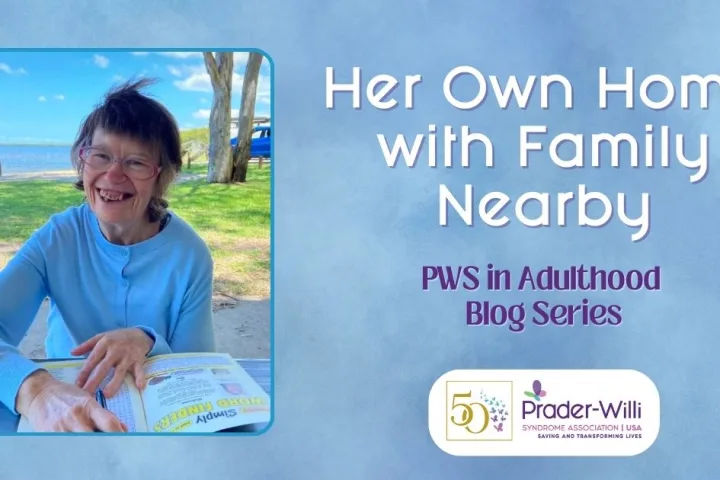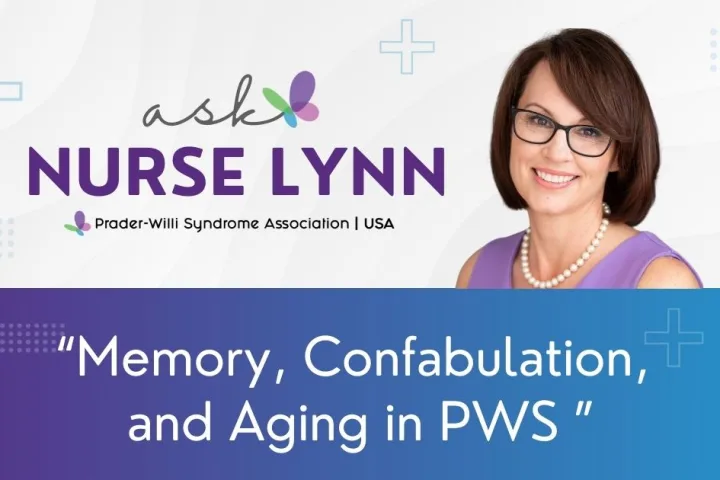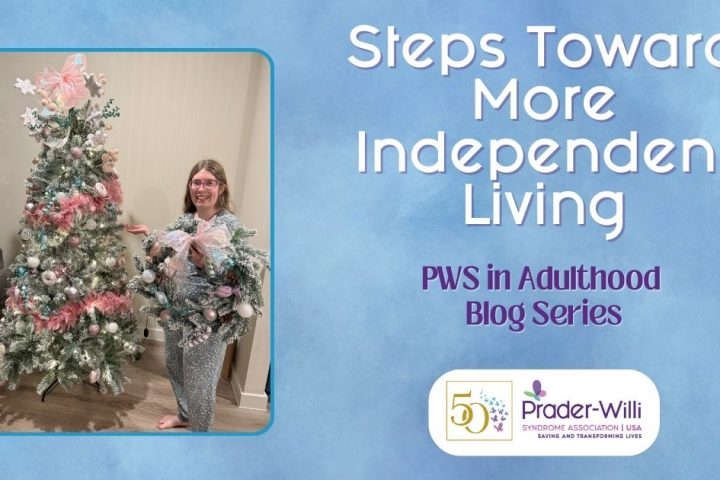contributed by Jamie Prentice, Mom to Logan, 31, living with PWS
Advice for Transitioning into Adulthood
It is important to gather information and familiarize yourself with SSI, your state’s Department of Disabilities and Special Needs, Guardianship, Stable Accounts, and Special Needs Trusts long before your child becomes an adult. I would start taking workshops or seeking other sources of this information. The PWSA | USA National Conference often offers workshops on Guardianship and Stable Accounts. While processes can differ from state to state, the general information is very helpful.
Know What is Offered
Be familiar with your local school system and through what age they will serve your child. To assist with options into adulthood, consult with your child’s case manager and familiarize yourself with what is offered for education, work (shelter or non-sheltered), volunteer options, and adult living options.
Connect with PWS Community
Connect with your state PWS Chapter and social media PWS groups as early as possible. Talk to as many parents as you can. I have found that I have gained very helpful information even from other PWS families who opted to make decisions very different from the decisions our family has made. Talk to parents of both younger and older children as well. Parents have a lot of information and experience. Connect and stay connected with The Foundation for Prader-Willi Research and The Prader-Willi Syndrome Association as resources.
Sign Up for Services
Find out who has experience providing services to people with PWS locally and in your state. Get your child on a waiting list for adult waiver services (or your state’s equivalent) AS SOON as they are eligible to be on the list. I cannot say this strongly enough. If you don’t act and are in a state with thousands of people on waiting lists for 20 + years (not uncommon), you may not be able to access imperative services for your child when they need them. Understand that waiver services are not portable from state to state, meaning that if your adult child gets a waiver in a state, that is likely where they will need to reside to obtain services. This can limit family options related to where you live in conjunction with your child.
Seek to understand how your state manages different adult living choices and agencies that offer these options. I suggest physically going and touring options before you may need them.
Logan’s Story
My son has had experiences living in both a non-PWS group living environment and is now living in a PWS-specific group home. Despite education and clear expectations surrounding his food and access to food, his weight skyrocketed in the non-PWS living situation.
Logan has lived in a PWS group home for seven years. He shares his home with seven other people. They have round-the-clock staff. He does not have 1 to 1 care. We speak on the phone multiple times a day, and I am there, or he comes home often. We have open communication about how he feels related to staff interaction. If there are issues, we address them.
I have conversations with him about his wishes and vision for his life, and this guides our choices for him. Due to the issues related to access to food, Logan works in a sheltered workshop and has not had a job outside of this environment. He volunteers weekly and participates in therapeutic horseback riding weekly. I continue to seek meaningful options to support Logan’s quality of life. Logan did not attend college as that was not fit based on his abilities.
Social Media and Vulnerability
Logan does have a cell phone and access to social media. We have parameters set up related to his use and monitor his interactions. We have discussed scams and he knows not to share his SS #, address, phone #, or credit card information with anyone. We have had situations where people attempted to access this kind of information. We have also had situations where people inappropriately interacted with him online. I would say navigating the digital world with our adult kids takes a lot of consideration and involvement, as they can be very vulnerable. We also discussed who has access to Logan at his house and that he is not to leave with anyone other than those designated.
The Importance of Trainings
A few other things that I think are important related to Logan’s group home experience. National (PWSA | USA Stacy Ward) came out and trained the agency that runs Logan’s group home. Management is attending additional training this summer. They are also providing menus for meals. If your child is in a group home, be sure they are connected with PWSA. They can provide invaluable resources and information. We are very fortunate to have a behavior team where Logan lives that is actively involved with the house and workshop staff and Logan and his housemates. They are involved in staff training and proactive practices to positively impact behavioral outcomes. I strongly suggest the intervention of a behaviorist or ABA therapy for children and adults with PWS. That has been incredibly impactful for us.
We have worked very hard to have continuity and consistency through service provision with the team at Logan’s house, the workshop, his volunteer, and outside activities. This takes a lot of collaboration, but consistency is the key to his success. Menus and schedules (that they have had input on) are posted at the house and workshop to allow clients access. Additionally, Logan keeps copies of the PWS Medical Alert booklet in his backpack. I have one in my car and the GI Algorithm, offered by PWSA, on my phone. If he gets transported to the hospital I can reference it with the care staff. This has happened many times.
Meeting Public Servants
The other thing to consider doing for your adult with PWS is having them meet and interact with Police, EMS, and Fire in non-emergency situations. We do have frequent interaction with these departments. Having public servants familiar with your adult with PWS is mutually beneficial and can reduce misunderstandings and foster better outcomes during emergencies. Logan’s group home is actually inviting these departments into the house to do meet-and-greets to help them become familiar with the house, the clients, and the syndrome.
Continue Your Search
I hope some of what we have learned navigating the world of PWS for 31 years can benefit you. The last thing I will share is that although we may be faced with many challenges, I encourage people to keep relentlessly seeking solutions. There continue to be options and solutions when I am sure we have turned over every stone. Keep seeking…
Share this!





 Jennifer Bolander has been serving as a Special Education Specialist for PWSA (USA) since October of 2015. She is a graduate of John Carroll University and lives in Ohio with her husband Brad and daughters Kate (17), and Sophia (13) who was born with PWS.
Jennifer Bolander has been serving as a Special Education Specialist for PWSA (USA) since October of 2015. She is a graduate of John Carroll University and lives in Ohio with her husband Brad and daughters Kate (17), and Sophia (13) who was born with PWS. Perry A. Zirkel has written more than 1,500 publications on various aspects of school law, with an emphasis on legal issues in special education. He writes a regular column for NAESP’s Principal magazine and NASP’s Communiqué newsletter, and he did so previously for Phi Delta Kappan and Teaching Exceptional Children.
Perry A. Zirkel has written more than 1,500 publications on various aspects of school law, with an emphasis on legal issues in special education. He writes a regular column for NAESP’s Principal magazine and NASP’s Communiqué newsletter, and he did so previously for Phi Delta Kappan and Teaching Exceptional Children. Evan has worked with the Prader-Willi Syndrome Association (USA) since 2007 primarily as a Crisis Intervention and Family Support Counselor. Evans works with parents and schools to foster strong collaborative relationships and appropriate educational environments for students with PWS.
Evan has worked with the Prader-Willi Syndrome Association (USA) since 2007 primarily as a Crisis Intervention and Family Support Counselor. Evans works with parents and schools to foster strong collaborative relationships and appropriate educational environments for students with PWS. Dr. Amy McTighe is the PWS Program Manager and Inpatient Teacher at the Center for Prader-Willi Syndrome at the Children’s Institute of Pittsburgh. She graduated from Duquesne University receiving her Bachelor’s and Master’s degree in Education with a focus on elementary education, special education, and language arts.
Dr. Amy McTighe is the PWS Program Manager and Inpatient Teacher at the Center for Prader-Willi Syndrome at the Children’s Institute of Pittsburgh. She graduated from Duquesne University receiving her Bachelor’s and Master’s degree in Education with a focus on elementary education, special education, and language arts. Staci Zimmerman works for Prader-Willi Syndrome Association of Colorado as an Individualized Education Program (IEP) consultant. Staci collaborates with the PWS multi-disciplinary clinic at the Children’s Hospital in Denver supporting families and school districts around the United States with their child’s Individual Educational Plan.
Staci Zimmerman works for Prader-Willi Syndrome Association of Colorado as an Individualized Education Program (IEP) consultant. Staci collaborates with the PWS multi-disciplinary clinic at the Children’s Hospital in Denver supporting families and school districts around the United States with their child’s Individual Educational Plan. Founded in 2001, SDLC is a non-profit legal services organization dedicated to protecting and advancing the legal rights of people with disabilities throughout the South. It partners with the Southern Poverty Law Center, Protection and Advocacy (P&A) programs, Legal Services Corporations (LSC) and disability organizations on major, systemic disability rights issues involving the Individuals with Disabilities Education Act (IDEA), Americans with Disabilities Act (ADA), and the federal Medicaid Act. Recently in November 2014, Jim retired.
Founded in 2001, SDLC is a non-profit legal services organization dedicated to protecting and advancing the legal rights of people with disabilities throughout the South. It partners with the Southern Poverty Law Center, Protection and Advocacy (P&A) programs, Legal Services Corporations (LSC) and disability organizations on major, systemic disability rights issues involving the Individuals with Disabilities Education Act (IDEA), Americans with Disabilities Act (ADA), and the federal Medicaid Act. Recently in November 2014, Jim retired.